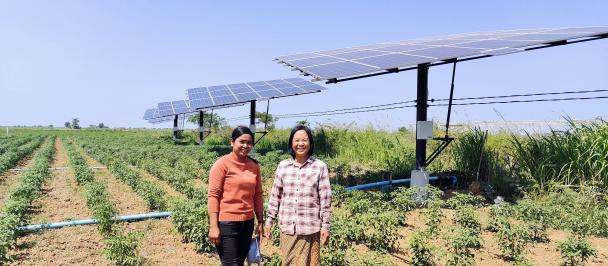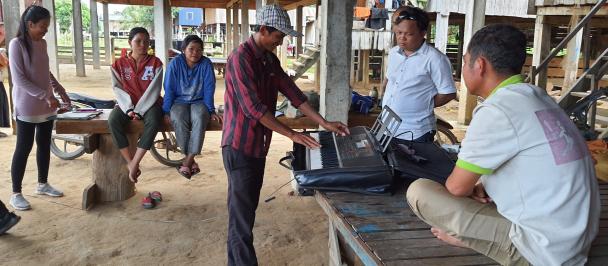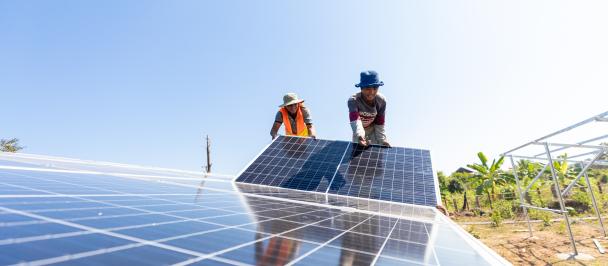Op-ed by: Mr. Shakeel Ahmad, Deputy Resident Representative, UNDP Cambodia
A Just Transition for Cambodia – Unlocking Inclusive Green Growth
April 26, 2025

Large-scale solar water pump in Kampong Thom Province.
As Cambodia approaches graduation from Least Developed Country (LDC) status by 2029 and navigates turbulent times, it is presented with formidable challenges and transformative opportunities. The path ahead must safeguard economic growth and ensure sustainable, inclusive, and resilient development. The concept of a Just Transition offers a compelling framework for achieving this, guiding Cambodia through its shift to a low-carbon economy in a way that benefits all segments of society and leaves no one behind.
Cambodia is one of the most climate-vulnerable countries in Southeast Asia. Increasingly severe floods, droughts, and storms affect agricultural productivity, livelihoods, and public health. UNDP estimates that without additional adaptation measures, Cambodia’s GDP could contract up to 10 percent annually by 2050 due to the impacts of climate change. However, within these daunting projections lies a powerful opportunity: embracing a Just Transition could generate approximately 449,000 green jobs in sectors such as clean energy, sustainable agriculture, green construction, and waste management by 2050.
A Just Transition is not simply about reducing carbon emissions but about fostering opportunity, equity, and resilience across all levels of society. This means ensuring workers in carbon-intensive and climate-vulnerable sectors such as garments, agriculture, and tourism have the skills, protections, and opportunities to thrive in a greener economy. It also involves promoting gender equity by integrating women into emerging climate-smart value chains and capitalizing on Cambodia’s demographic dividend, with two-thirds of its population under thirty, to build a dynamic green workforce for the future.
Cambodia is already taking necessary steps towards this vision. The government is advancing a National Circular Economy Strategy and implementing energy efficiency regulations to support sustainable construction and consumption. At the same time, the country’s significant solar and wind energy potential remains largely untapped, offering cost-effective pathways for clean energy generation that can fuel economic transformation. Additionally, efforts to promote climate-smart agriculture and value-added agro-processing will create new avenues for rural communities to participate in and benefit from green growth.
Nevertheless, significant barriers remain. High levels of informality in the economy limit the reach of social protection and the ability to plan effectively for labor market transitions. Institutional coordination on climate action requires further strengthening, while women and marginalized groups remain underrepresented in green sectors. Moreover, Cambodia’s impending LDC graduation will reduce its access to concessional financing, potentially constraining the resources available for sustainable development initiatives.
Overcoming these challenges will require a concerted and coordinated effort. Cambodia must develop sector-specific roadmaps for a just transition in the garments, agriculture, and construction industries, while expanding social protection schemes to include informal and climate-affected workers. Scaling up climate finance is essential, with Cambodia targeting an additional one hundred million dollars in green and SDG-aligned investments by 2028. It is also crucial to invest in the training and developing skills in areas such as energy management and green technologies, particularly within industrial sectors, and to incorporate heat stress adaptation into labor policies and urban planning frameworks.
UNDP is deeply committed to supporting Cambodia on this critical journey. We are assisting with formulating Cambodia’s Nationally Determined Contribution (NDC 3.0) and the Integrated National Financing Framework. UNDP supported the design of Cambodia’s first local currency bond and contributed to the National Circular Economy Strategy, including reducing plastic pollution. In partnership with our development partners, we have helped expand access to renewable energy, such as solar technologies for rural development, and have supported policy reforms that integrate just transition principles into national strategies.
Looking ahead, we are working to operationalize projects to eliminate hazardous waste in supply chains, particularly in the construction sector, and reduce nearly half a million metric tons of CO2 equivalent. We will continue to support Cambodia's efforts toward a green industrial base, enhancing social protection, and fostering inclusive digital governance frameworks.
A Just Transition represents more than a climate response; it is Cambodia’s opportunity to build an inclusive, sustainable, and resilient economy. It is a chance to transform current vulnerabilities into future strengths by investing in people, protecting the environment, and driving equitable growth. The time to act is now to ensure that Cambodia’s path towards prosperity truly leaves no one behind.

 Locations
Locations



